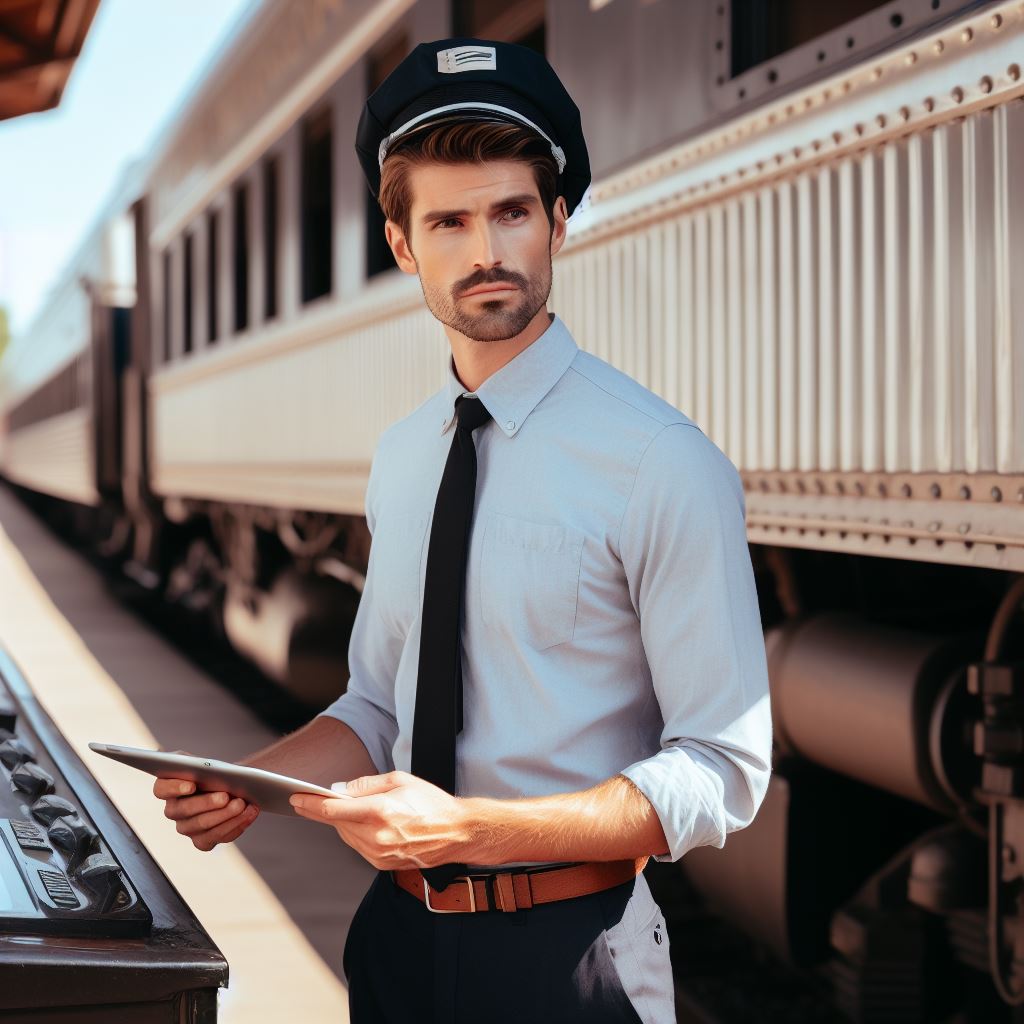Introduction
Train conductors, engineers, and brakemen are essential roles in the railway industry. Each position entails different responsibilities that contribute to the overall operation and safety of trains.
Understanding these differences is crucial to maintaining an efficient and organized railway system.
A train conductor is responsible for the overall management of the train. They ensure the safety of passengers, check tickets, and coordinate with other train crew members.
The conductor also communicates with the engineer regarding speed, stops, and any issues that arise during the journey.
On the other hand, an engineer operates the train and is responsible for its mechanical aspects. They are skilled in controlling the locomotive, monitoring signals, and adjusting speed accordingly.
Engineers have thorough knowledge of railway systems and are trained to handle emergencies efficiently.
Brakemen play a vital role in the safe operation of trains. They work alongside the conductor and engineer to control the speed and stopping of the train.
Brakemen manage the train’s brakes, ensuring proper application and release to maintain safe distances between trains.
Importance of understanding the roles of each position in the railway industry
Understanding these roles is crucial for anyone involved in the railway industry.
Proper coordination and communication between conductors, engineers, and brakemen are vital to ensure the safety of passengers and the efficient movement of trains.
Each position contributes to the smooth functioning of the railway system, and awareness of these differences can enhance overall performance.
In general, train conductors, engineers, and brakemen have specific roles within the railway industry. Each position carries unique responsibilities that contribute to the safe and efficient operation of trains.
By understanding these differences, we can appreciate the importance of teamwork and the significance of each role in ensuring a well-functioning railway system.
Train Conductors
Definition and primary responsibilities of train conductors
- Train conductors are responsible for ensuring the safe and efficient operation of trains.
- They oversee the boarding and disembarking of passengers and ensure their safety during the journey.
- Conductors also communicate with other crew members and coordinate tasks throughout the trip.
- They play a crucial role in providing a comfortable and secure travel experience for passengers.
- Conductors are responsible for collecting tickets, maintaining passenger records, and addressing customer concerns.
Skills and qualifications required for the role
- Train conductors must have excellent communication skills to interact with passengers and crew.
- They need strong organizational abilities to handle ticketing, schedules, and records.
- Attention to detail is essential to ensure all safety protocols and procedures are followed correctly.
- Good problem-solving skills are important in handling unexpected situations or emergencies.
- Physical fitness and agility are required for conducting inspections and moving around the train.
Specific duties related to the safety and efficiency of train operations
- Conduct pre-departure inspections to ensure that all safety equipment is in proper working condition.
- Monitor the train’s speed, brakes, and signals during the journey to ensure compliance with regulations.
- Coordinate with engineer and crew to ensure smooth train operations and adherence to schedules.
- Respond promptly to emergencies or technical malfunctions to maintain passenger safety.
- Ensure that all regulations regarding passenger capacity, baggage, and safety are consistently followed.
Importance of customer service and interpersonal skills
- Train conductors serve as the face of the railway company, interacting directly with passengers.
- Providing exceptional customer service enhances the overall travel experience for passengers.
- Conductors need to handle customer inquiries, complaints, and requests with professionalism and empathy.
- Strong interpersonal skills enable conductors to build rapport and maintain a pleasant atmosphere on board.
- Positive interactions with passengers contribute to customer satisfaction and loyalty.
Training and certifications necessary for becoming a train conductor
- Prospective train conductors must complete a training program approved by the railway company.
- Training covers topics such as safety procedures, customer service, and basic railway operations.
- Once training is complete, aspiring conductors must pass examinations to obtain necessary certifications.
- Ongoing professional development is often required to maintain knowledge of industry updates and regulations.
- Previous experience in customer service or related fields can be beneficial for aspiring train conductors.
Read: Safety Protocols Every US Train Conductor Must Know
Engineers
Definition and primary responsibilities of engineers
Engineers are professionals who operate locomotives and are responsible for controlling train movement.
Skills and knowledge required for operating locomotives
Engineers need to possess excellent hand-eye coordination, spatial awareness, and the ability to make quick decisions.
They should have a deep understanding of train operations, including acceleration, braking, and handling emergencies.
Engineers must also have a thorough knowledge of safety protocols and regulations to ensure accident-free operations.
Understanding the technical aspects of train operation and equipment
Engineers need to be familiar with the mechanical and electrical systems of locomotives and the different types of train cars.
They must understand how to inspect and maintain locomotives to ensure their optimal performance and prevent breakdowns.
Roles in ensuring safe and efficient train movement
Engineers play a crucial role in maintaining the safety of train operations by adhering to speed limits and signaling rules.
They ensure smooth and efficient train movement by coordinating with conductors, brakemen, and dispatchers.
In case of emergencies or abnormal conditions, engineers have the expertise to take immediate corrective actions.
Training and qualifications needed to become an engineer
Becoming an engineer requires rigorous training and education, typically obtained through vocational schools or apprenticeship programs.
Engineers must pass written examinations, giving them the appropriate certifications to operate locomotives. They undergo on-the-job training to gain practical experience and enhance their skills in train operations.
Read: Union Representation and Benefits for Train Conductors
Learn More: An Overview: The Role of a Train Conductor in the USA
You Might Also Like: Training & Education Pathways for Air Traffic Control in the USA
Brakemen
Definition and primary responsibilities of brakemen
- Brakemen are railway workers responsible for assisting in the control and operation of train brakes.
- They ensure the safe and efficient slowing down, stopping, and parking of trains.
- Brakemen perform manual tasks such as applying and releasing brakes, switching tracks, and assisting with coupling and uncoupling railroad cars.
- Their primary goal is to maintain the optimal performance and safety of the train throughout the journey.
Purpose and importance of controlling and manipulating train brakes
- Controlling train brakes is crucial for ensuring the safe transportation of goods and passengers.
- Train brakes allow for the regulation of speed, enabling the train to navigate different terrains and maintain a stable and controlled movement.
- Proper application and manipulation of brakes help prevent accidents, minimize wear and tear on equipment, and maximize fuel efficiency.
- Without skilled brakemen effectively managing train brakes, the entire railway operation would be at risk.
Collaborative role with the conductor and engineer during operations
- Brakemen closely collaborate with conductors and engineers to coordinate actions and ensure a smooth train operation.
- They receive instructions regarding speed adjustments, coupling and uncoupling of cars, and track switching from the conductor.
- Engineers rely on brakemen’s prompt communication to implement brake adjustments and maintain the appropriate pressure throughout the train.
- This collaborative effort is essential for maintaining operational efficiency and guaranteeing the safety of the train and its passengers.
Training and skills necessary for becoming a brakeman
- Brakemen undergo specialized training programs provided by railway companies or technical schools.
- They learn about the mechanics of train brakes, safety protocols, and operational procedures.
- Brakemen need the physical strength and agility to handle heavy equipment and perform manual tasks efficiently.
- Attention to detail, quick reflexes, and effective communication skills are vital for their role.
Career progression opportunities within the railway industry
- Brakemen can advance their careers by gaining experience and acquiring additional skills.
- With experience, they may become conductors, responsible for overseeing the overall train operations.
- Some brakemen choose to specialize in specific types of trains or cargo handling, such as hazardous
materials. - Career progression within the railway industry often involves attending further training programs and obtaining relevant certifications.
This section explores the role of brakemen, the importance of their responsibilities.
Their collaboration with conductors and engineers, the necessary training and skills, and the opportunities for career progression within the railway industry.
Brakemen play a vital role in ensuring the safety and efficiency of train operations.
Read: Challenges and Rewards of Being a Train Conductor

Find Out More: The Role of U.S. Logisticians During Global Crises
Key Differences between Train Conductors, Engineers, and Brakemen
Overview of the unique roles and responsibilities of each position
- Train Conductors: Responsible for overseeing the safe boarding, ticketing, and departure of passengers.
- Engineers: Responsible for operating and controlling the locomotive and ensuring efficient and safe transportation.
- Brakemen: Responsible for operating the brakes and ensuring the safe coupling and uncoupling of railcars.
Contrasting skill sets, qualifications, and training requirements
- Train Conductors: Require excellent communication and customer service skills, along with knowledge of safety protocols.
- Engineers: Need extensive technical knowledge, including understanding locomotive systems and operating procedures.
- Brakemen: Require physical strength and agility to handle heavy equipment and perform manual labor tasks.
Differences in work environments and daily routines
- Train Conductors: Work both on board trains and in train stations, dealing with passengers and ensuring their comfort.
- Engineers: Work in the locomotive cab, keeping a constant focus on the track ahead and monitoring the train’s performance.
- Brakemen: Work on railcars, often outdoors, and are responsible for the manual labor involved in coupling and uncoupling.
The importance of teamwork and collaboration in these positions
Train operations require seamless coordination and communication between conductors, engineers, and brakemen.
They must work together to ensure timely departures, efficient movements, and the safety of passengers and goods.
Transform Your Career Today
Unlock a personalized career strategy that drives real results. Get tailored advice and a roadmap designed just for you.
Start NowHow each role contributes to the overall success of railway operations
- Train Conductors: Ensure the smooth flow of passengers, handle emergencies, and maintain customer satisfaction.
- Engineers: Operate the train according to schedules and safety protocols, ensuring safe and timely transportation.
- Brakemen: Play a crucial role in the safe coupling and uncoupling of railcars, preventing accidents or derailments.
Ultimately, the key differences among train conductors, engineers.
And brakemen lie in their specific responsibilities, required skills, work environments, and contributions to the overall success of railway operations.
Collaboration and teamwork are fundamental for a harmonious and efficient railway system.
Read: Train Conductor Salaries: An In-depth Analysis by State
Conclusion
In this exploration of railway roles, we’ve delineated the distinct duties of conductors, engineers, and brakemen.
Conductors oversee operations and passenger safety, engineers drive trains, and brakemen manage braking systems. Understanding these differences is vital for anyone considering a career in the railway industry.
Each role contributes uniquely to the safe and efficient operation of trains, reflecting a diverse spectrum of responsibilities.
We encourage readers intrigued by the railway industry to explore these distinct career opportunities. By understanding the nuances among these crucial positions, individuals can make informed career choices.
The railway sector offers a rich array of roles, each with its specialized functions, making it an appealing industry for those seeking varied and dynamic career paths.
Exploring opportunities in this field provides a gateway to contribute significantly to transportation while embracing a profession that blends tradition with innovation.
[E-Books for Sale]
The Big Book of 500 High-Paying Jobs in America: Unlock Your Earning Potential
$19.99 • 500 High-Paying Jobs • 330 pages
Explore 500 high-paying jobs in America and learn how to boost your career, earn more, and achieve success!
See All 500 High-Paying Jobs of this E-Book
1001 Professions Without a Degree: High-Paying American Jobs You Can Start Now
$19.99 • 1001 Professions Without a Degree • 174 pages
Discover 1001 high-paying jobs without a degree! Unlock career tips, skills, and success strategies for just $19.99!




